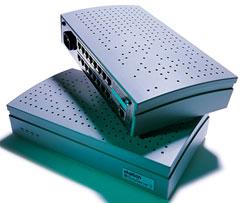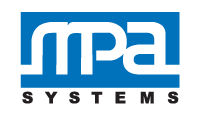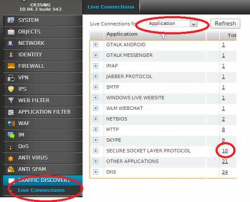Stallion Easy Server II

Small to Medium sized businesses adding Windows clients to UNIX and NT networks benefit from secure dial-up access and cost-effective branch office connections with EasyServer II.
The first browser-friendly access server for cross-platform networks.
EasyServer II is a flexible access server for TCP/IP-based networks. It delivers on-demand dial-up remote access and routing, as well as serial connectivity for server computers. EasyServer II gives small to medium-sized businesses a wide range of networking features in one cost-effective package.
EasyServer II also supports industry-standard terminal session access to multiple Unix systems on TCP/IP networks, with shared access to serial devices for many Intel and RISC-based Unix platforms.
Secure Dial-up Remote Access
With EasyServer II, you can extend multi-platform networks to provide mobile workers with access to central office resources, as well as deliver dial-out access to the Internet and electronic faxing. EasyServer II allows today's client PCs to dial into any TCP/IP network, browse intranets, collect e-mail, access databases and transfer files over analog or digital connections. EasyServer II supports data transfer rates of up to 230 Kbps, whether using external modems or ISDN terminal adapters.
EasyServer II delivers security with CHAP, PAP, dial-back support and multi-level password protection. In addition, RADIUS authentication and accounting allows you to build a secure network using third party authentication applications.
Easy Access for Branch Offices
By using EasyServer II as a flexible dial-up router, remote office LANs generating moderate traffic can be connected to the central network file servers and resources cost-effectively. EasyServer II's Dial-on-Demand Routing (DDR) support dynamically establishes connections and can eliminate the need for an expensive dedicated leased line or Frame Relay connection.
Extending the Power of Windows NT Networking
The Extend software for Windows NT lets you easily configure the serial ports on an EasyServer II as intelligent COM ports on one or many NT servers anywhere on the network, yet work in concert with applications such as Windows NT Remote Access Service (RRAS). Therefore, you can enjoy Microsoft's multi-protocol (TCP/IP, IPX/SPX, NetBEUI) dial-up networking environment.
Extend is fully compatible with Windows NT serial ports, so third party communications applications are guaranteed to function flawlessly. Modem pooling, data collection from point of sale or plant equipment and dial-out services are only a sample of the possible applications.
Reliable Access to UNIX Applications and Networking Services
EasyServer II's TruPort software provides full local Unix serial port functionality from anywhere on the network, whether local, on a remote LAN or with dial-up PPP connections. TruPort makes the ports on EasyServer II operate as if they are native ports with the standard Unix TTY applications interfaces.
Truport also allows multiple Unix servers to share EasyServer II ports across the network, giving sites with mirrored Unix servers complete fail-over requirements.
Making Network Access Easier
EasyServer II's resident Web engine lets you access and manage EasyServer II from any web browser on your network. In addition, both the Extend and TruPort software allow you to manage ports from Windows NT and Unix systems using simple, intuitive interfaces.
EasyServer II's benefits include:
Perfect for small to medium-sized businesses with mixed platform networks
Web-based GUI makes it easy to install, configure and manage from any PC - with no new software to install or learn
Extensive security ensures no one gets unauthorized access to the network
Support for third-party modem pooling solutions lets you share your equipment across the network more efficiently
Demand Dial Routing gives you branch office routing and Internet access without the need for a dedicated leased line
TruPort and Extend let you use EasyServer II's ports as if they were directly connected to a UNIX or NT server, run server-based applications without modification and deliver server-based remote access and routing to any LAN segment


